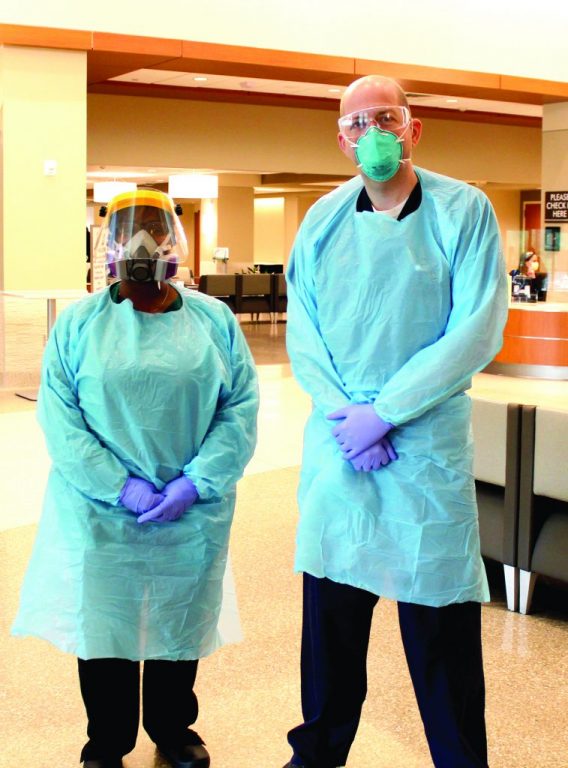Hospitals and urgent care facilities across the country have seen a significant and troubling decrease in non-coronavirus related patients since March.
“Nationally, according to data from the Urgent Care Association, urgent care volumes are down over 50 percent,” said Alan Ayers, Chief Executive Officer of Velocity Urgent Care. “We’ve seen a similar downward decline with hospital ERs. Many PCP offices are closed and while many have migrated to telemedicine, consumer adoption of telemedicine remains low as it’s extremely limited in its capabilities.”
Gloucester’s Velocity Urgent Care has proved to be no exception. It began to see a steady decline in patient turnout beginning in late March and early April, according to Colleen Naumann, Nurse Practitioner at Gloucester’s Velocity Urgent Care. She said she believes this is due to the stay-at-home order and people’s fear of contracting the coronavirus.
“We are seeing this nationwide that people are waiting at home sick and in pain, many with bad injuries and many without their chronic medications because they are fearful of coming in,” said Naumann. “Many conditions can become life-threatening or life-altering rapidly.
“Some examples of this would include abdominal pain which could be indicative of a surgical condition such as an appendicitis,” she said. “Urinary symptoms can become toxic rapidly and lead to sepsis. Seasonal allergy symptoms left untreated can lead to bronchitis and put folks with respiratory compromise such as COPD in dire situations.
“Furthermore, they can cause symptoms that mimic the COVID-19 virus and lead to increased anxiety. Muscular-skeletal injuries left untreated can lead to vascular compromise. These conditions can and should be treated safely and effectively in our Urgent Care settings at the onset of symptoms.”
“Not only is it easier and less expensive to treat illnesses early on, but doing so also reduces medical complications which jeopardize the patient’s overall health,” said Ayers.
Foregoing medical care during the pandemic is also expected to have adverse effects after the virus is over. “Industry experts estimate that up to 20 percent of Urgent Care centers may not re-open after the current crisis,” he said. “Velocity Urgent Care has temporarily reduced its hours in Gloucester to Monday-Friday only.”
“The biggest challenge in this time is helping the public to understand that Urgent Care sites are an extremely safe place to obtain medical care,” said Naumann. “The medical community has been fighting the spread of infection for decades. We are in fact the most trained to do so and this includes wearing PPE with all patients and also providing them with protective devices when they enter our building.
“We are patient advocates,” she said. “This is at the heart of every decision we make. We care for and protect the public.”
Riverside
Riverside Health System has also seen a similar downward trend in patients. According to Bill Downey, Chief Executive Officer of RHS, over the last several weeks Riverside has seen its surgical volumes drop about 60 percent, admissions drop about 20 percent, office and ambulatory visits decrease by half and even emergency visits have dropped about 45 percent.
As part of a series of videos on the Riverside COVID-19 YouTube Channel, Dr. Gary Kavit, Medical Director Emergency Services at Riverside Regional Medical Center, details the importance of visiting the emergency department when needed, especially for those who are experiencing stroke or heart attack symptoms.
“So, during this time of widespread pandemic, stroke and heart attacks have not taken a vacation,” said Kavit. “We’re still seeing strokes. We’re still seeing heart attacks. And we have a separate area to keep our COVID patients, so a patient who’s experiencing stroke symptoms or heart attack symptoms should feel at ease at coming to the emergency department.”
Kavit also said that “it’s critically important that the public understand that we have the ability to reverse strokes. We have the ability to reverse heart attacks. But it’s all time-sensitive. So, you cannot take the time to wait to see if your symptoms are going to get better. If you want the therapies that we are able to provide, you have to come in before damage is irreversible.
“The recommendation is as soon as you think you have a serious problem like a stroke or heart attack is to call 911 and get to the hospital as soon as you can,” said Kavit.
After experiencing a significant decline in emergency room visits in March and April along with the rest of the health system, Riverside Walter Reed Hospital has seen an increase in emergency room visits over the last week according to Dr. Melvin D. Schursky, Chief Medical Officer/RWRH.
Though Walter Reed never experienced a true surge in COVID-19 patients, its staff is still taking precautions. For all other non-COVID-19 patients, all staff wears a surgical mask, gloves and eye protection.
For COVID-19 patients they have to wear either a P100 respirator or an N95 mask and either goggles or a face shield. Another option they have is to wear the PAPR, a special hood that covers the whole head and allows filtering of air through a machine.
Even though Riverside has a no-visitor policy at this time, staff is still making sure that patients and families still feel connected. According to Lanell Williams, Director of Critical Care at Walter Reed, they are using iPads to FaceTime the families of patients. “The patients want that family support,” said Schursky.
The latest information on COVID-19 and maintaining wellness during the pandemic can be found on the Riverside COVID-19 YouTube channel, the Riverside Facebook page and Riverside Health System’s website at riversideonline.com/covid_19/index.cfm.

